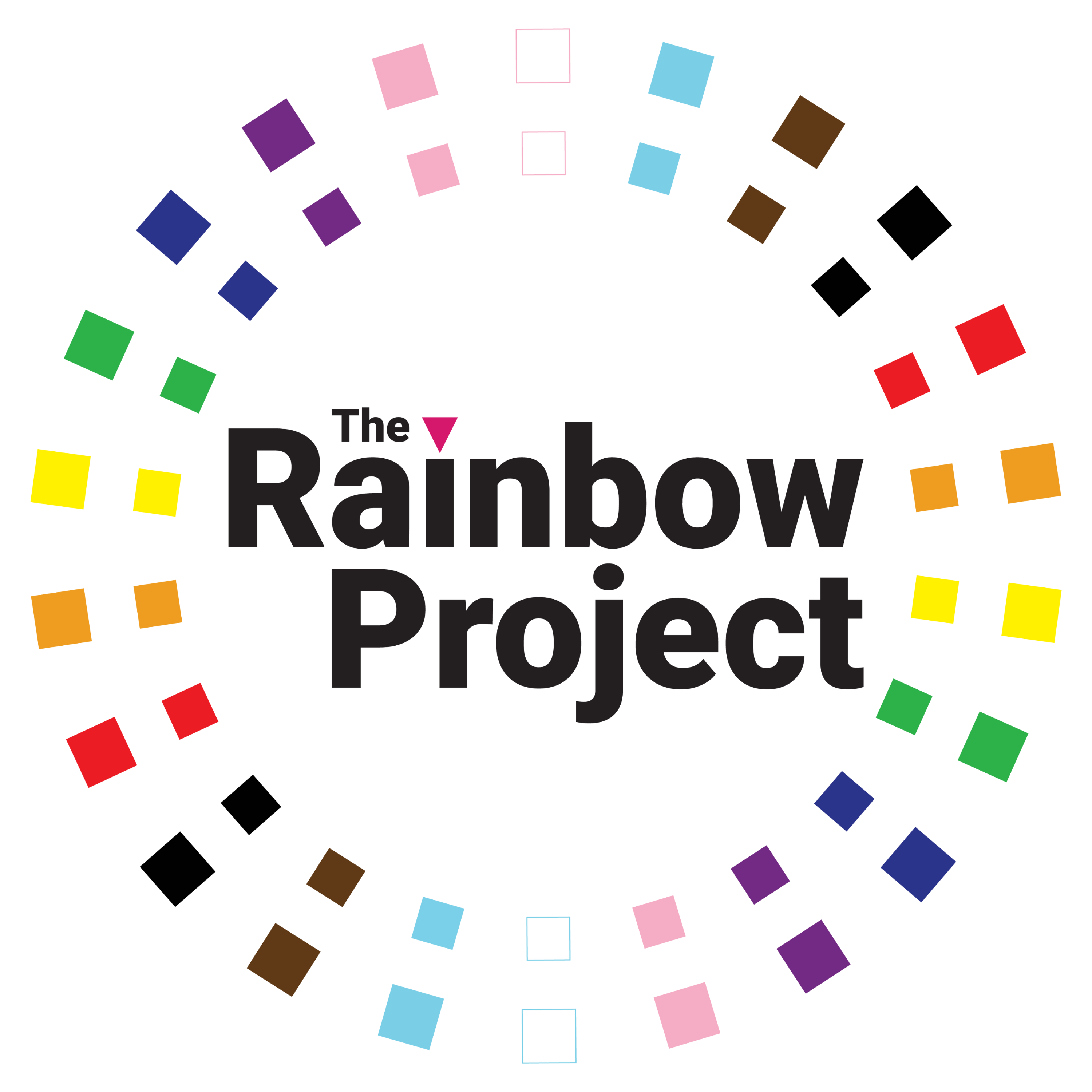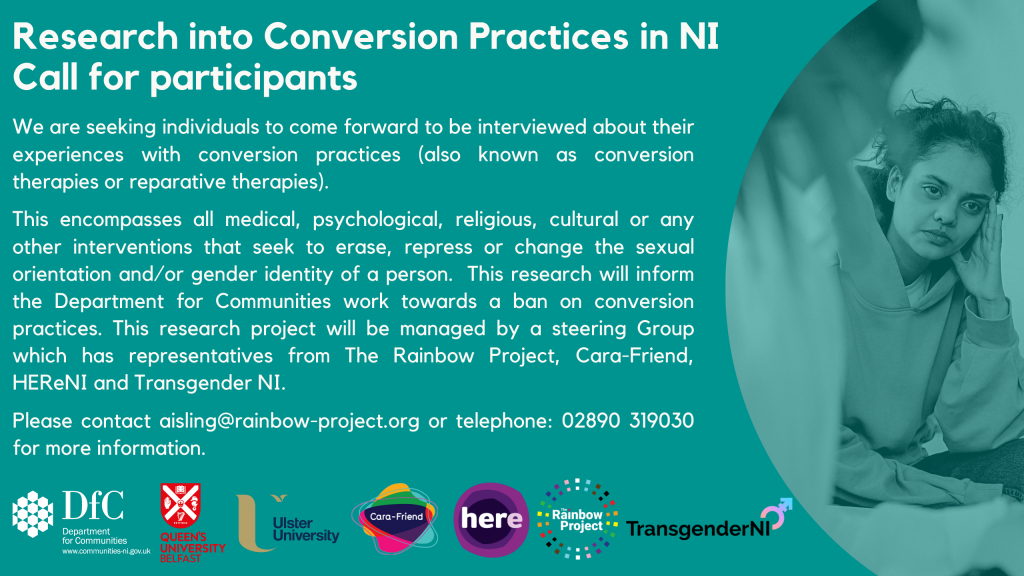We are recruiting LGBTQIA+ people with experiences of Conversion Practices (also known as conversion therapies, reparative therapies, and cure therapies) to take part in interviews about their experience.
Call out for individuals to be interviewed about their experiences with conversion practices (also known as conversion therapies or reparative therapies). These practices encompasses all medical, psychological, religious, cultural or any other interventions that seek to erase, repress or change the sexual orientation and/or gender identity of a person.
This encompasses all medical, psychological, religious, cultural or any other interventions that seek to erase, repress or change the sexual orientation and/or gender identity of a person. This research will inform the Department for Communities’ work towards a ban on conversion practices.
Please contact Aisling@rainbow-project.org for more information.
If you or someone you know has been exposed to conversion practices which aimed to change their sexual orientation or gender identity expression within 10 years, we would like to talk to them and hear about their experiences.
This research project will be managed by a Steering Group which will be made up of representatives of The Rainbow Project, Cara-Friend, HEReNI and Transgender NI and is funded by the Department of the Communities.
Why am I being contacted?
We are sending out a call for participants to take part in this research, which is an individual interview about their experiences of conversion practices (also known as conversion therapies, reparative therapies, and cure therapies). This encompasses all medical, psychological, religious, cultural or any other interventions that seek to erase, repress or change the sexual orientation and/or gender identity of a person.
Why is this study being done?
This research, funded by the Department for Communities, explores the dimensions and effects of these practices using qualitative interviews with people who have experienced conversion practices in Northern Ireland. The theoretical and empirical aspects of the research will be informed by the broader literature and evidence in the field of research.
Who are the Research Team?
Professor Fidelma Ashe, Ulster University, Belfast
Fidelma Ashe is a professor of Politics at Ulster University. She is an expert in gender, sexuality and peacebuilding. She is housed in the Transitional Justice Institute at Ulster (TJI). TJI is a world-class research institute that produces research and real-world impact in the area of peacebuilding. Professor Ashe’s profile can be found here: https://www.ulster.ac.uk/staff/f-ashe
Dr Danielle Mackle, Queens University, Belfast
Dr Danielle Mackle is a lecturer in Social Work in the School of Social Sciences, Education and Social Work at Queen’s University Belfast. Her research specialisms include exploring the human development and well-being of LGBTQ+ populations through the lens of the capability approach. Danielle also has experience in researching and writing about sensitive issues in Northern Ireland including abortion and FGM/C practices. Dr Mackle’s profile can be found here: https://pure.qub.ac.uk/en/persons/danielle-mackle
Information on TJI can be found here: https://www.ulster.ac.uk/transitional-justice-institute/home
What will I need to do?
Your participation is entirely voluntary. There is no obligation to participate in the study. If someone chooses to participate they are free to withdraw at any point without having to give a reason.
If a person decides to take part in this research, it will involve the participant being interviewed by one of the researchers involved in the study.
In this interview, they will be asked about their experiences of conversion therapy, decisions around engaging with conversion therapy, what the practice, therapy, treatment or intervention was like the effects on the person at the time, and how they feel about it now and any other information that the participant feel is relevant for us to know.
The interview will take place at a location and time that is convenient for participants.
Is there any payment for taking part? Will it cost me anything if I agree to take part?
No, we are not paying participants to take part in the study. It will not cost anything to take part in this research.
Are there any risks to me or others if participate?
The questioning may be upsetting or may trigger thoughts or feelings that people haven’t felt or remembered in a long time. If participants feel that talking about these issues or conversion therapy may be too upsetting, then we recommend that they should not take part in the interview and they will be signposted for future support.
If people choose to participate in these interviews and feel that they would like to talk to someone about any of the issues raised, participants will be given access to some free and confidential support counselling support.
Will my data be used in future studies?
We will need people’s contact details to arrange and conduct the interview. We will also ask for consent. Finally, we will audio record the interview and write a transcript based on this interview. The research team will delete contact details once the transcription of the interview is complete.
Personal data will only be used for the study set out in this form and not for any future studies. The researchers will write academic papers and present the findings from the study at conferences. Examples from the interviews or direct quotes may be used from transcripts, but all will be anonymized and no one will be able to identify you from any of the published material.
How can I find out more information or participate in the research?
If you would like to take part in this study, please email Aisling Playford, Policy and Advocacy Manager email aisling@rainbow-project.org, who will contact you to discuss taking part in the research and answer any questions you may have.
If you have found any of the information in this document upsetting and would like to talk to someone, support is available from The Rainbow Project. Please visit The Rainbow Project website for further information or call us on 02890 319030
Thank you for taking the time to read this information

